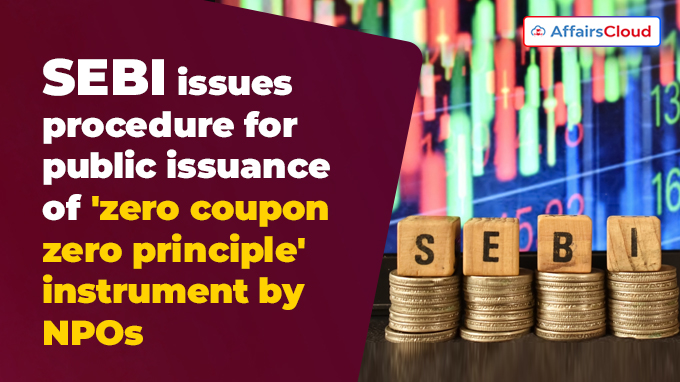
- This procedure is added in the Framework on SSE issued in September 2022.
- It should be noted that SSE framework resulted in the amendment of (Issue of Capital and Disclosure Requirements) Regulations, 2018 (ICDR Regulations) and (Listing Obligations and Disclosure Requirements) Regulations, 2015 (LODR Regulations).
Notes:
i.ZCZP instruments on the SSE are donation instruments offering no interest or principal return. Since it is a donation, not a loan or investment, the contributed funds will not be refunded to the donor.
ii.SSE, approved in 2022, is a trading platform allowing social enterprises and NPO to raise capital from investors that invest in social welfare programs.
- The SSE is a separate segment within the existing stock exchange i.e. National Stock Exchange (NSE) and BSE (formerly known as the Bombay Stock Exchange). It functions under the regulatory ambit of SEBI.
- As of November 2023, BSE-SSE has 32 entities and NSE-SSE has 31.
Procedure for Public Issuance of ZCZP Instruments by NPO
i.The NPO, via lead manager(s), submits the draft fundraising document to the registered SSE with specified fees and an application for in-principle approval.
ii.The draft document is posted on both SSE and the organization’s website for a minimum of 21 days for public comments.
iii.The SSE provides observations within 30 days of filing or receiving clarifications from the organization.
iv.The organization incorporates SSEs observations into the draft fundraising document and submits the final version before initiating the issuance.
Other Conditions:
i.ZCZP Instruments are issued solely in dematerialized form.
ii.Non-transferability is maintained until the instrument’s tenure ends.
iii.The minimum issue size is Rs. 50 lakhs.
iv.Minimum application size is set at Rs. 10,000.
v.A minimum subscription of 75% of proposed funds is required.
vi.In cases of under-subscription:
- Details on raising the remaining capital (75%-100%) are outlined.
- The fund raising document highlights potential impacts on social objectives if under-subscription persists; refunds are mandated if subscriptions fall below 75% of the issue size.
vii.The SSE records allotment details post-issuance.
viii.The SSE specifies additional norms regarding the issuance procedure, covering agreements with depositories, banks, ASBA matters, public issuance duration, allocation methodology, and other relevant ancillary matters.
Contents for Fundraising Documents:
i.Both the draft and final fund raising documents must provide true and adequate material disclosures for informed decision-making.
ii.In addition to the general requirement, these documents should include disclosures specified by the Board, with the possibility of the SSE mandating additional disclosures.
Minimum requirement to be met by NPO for registration with SSE in terms of Regulation 292F of the ICDR Regulations
i.NPOs must have a valid certificate under Section 12A/12AA/12AB/10(23C)/10(46) of the Income Tax (IT) Act, 1961 to be valid for at least the next 12 months.
ii.There should be disclosure of pending regulatory cases during registration.
iii.Report fines, promptly stating payment or appeal must be disclosed within 7 days.
iv.There should be Valid 80G registration under IT Act, 1961 for entities registered undersection 12A/12AA/ 12AB of IT Act, 1961.
v.There should be details of past social impact as per the existing practice of NPOs.
SEBI grants Stock Brokers Additional Day for Settling Clients’ Running Accounts
SEBI has also allowed stock brokers to settle Client’s Funds lying with Trading Member (TM) on Saturdays i.e. one more day is provided. Now, stock brokers can settle the running account of clients’ funds on the first Friday or Saturday of the quarter or month at the choice of the clients.
- The new framework will be applicable from the quarterly settlement of January-March 2024 and monthly settlement of January 2024.
- This information by SEBI is issued in exercise of powers conferred under Section 11(1) of the SEBI Act, 1992.
Key Points:
i.This decision has been taken after representations from Industry Standards Forum (ISF) stating operational difficulties during a single day of settlement.
ii.It will streamline settlement processes for brokers and banks enhances business efficiency while safeguarding investor interests through error-free settlements.
iii.Until now, clients’ unutilised funds lying in the trading account had to be transferred back to their bank accounts on the first Friday of every quarter or every month.
iv.Stock exchanges must issue an annual settlement calendar for uniformity and clarity on the settlement dates.
v.To prevent misuse, client funds received are mandated to stay in the Upstreaming Client Nodal Bank Account, with stock exchanges responsible for monitoring compliance.
Recent Related News:
i.SEBI has empanelled 12 entities, including Ernst & Young LLP (EY), KPMG Assurance and Consulting Services LLP, to provide digital forensic services to its search team for onsite data acquisition during search and seizure operations. This empanelment will be valid for 2 years.
ii.Russian State-owned Sberbank has become the first Russian bank to register with the SEBI as a foreign portfolio investor (FPI) for a Category I FPI license.
About Securities and Exchange Board of India (SEBI):
It was established as a statutory body in 1992 and the provisions of the SEBI India Act, 1992 (15 of 1992) came into force on January 30, 1992.
Chairperson– Madhabi Puri Buch
Headquarters– Mumbai, Maharashtra